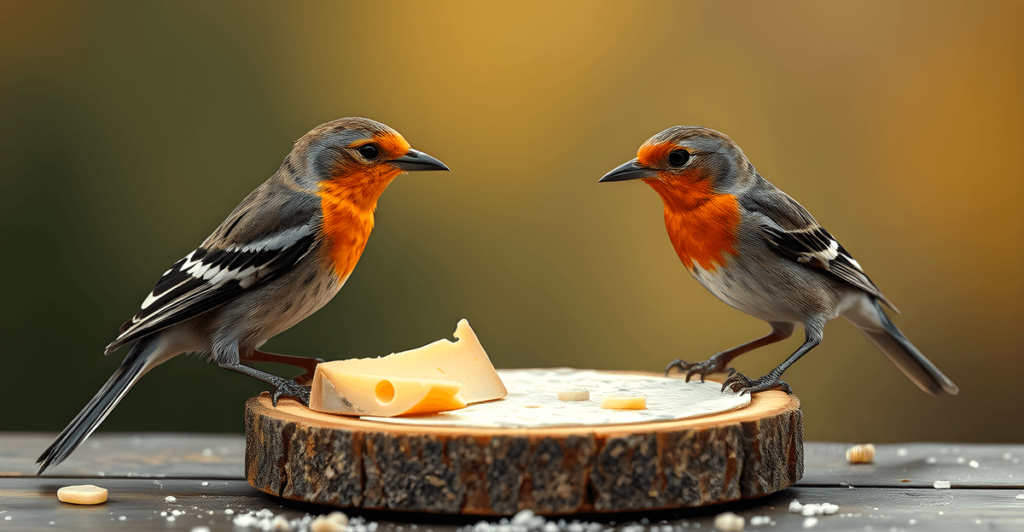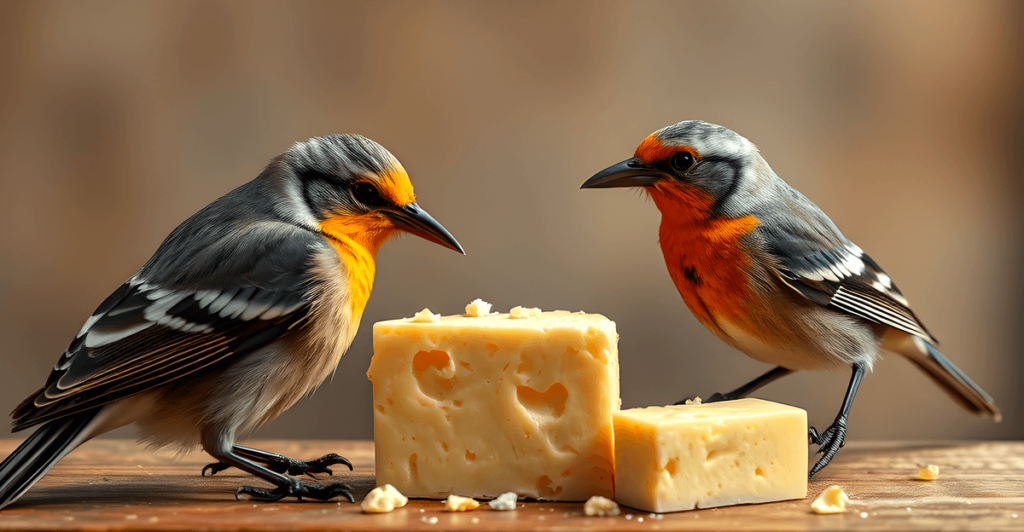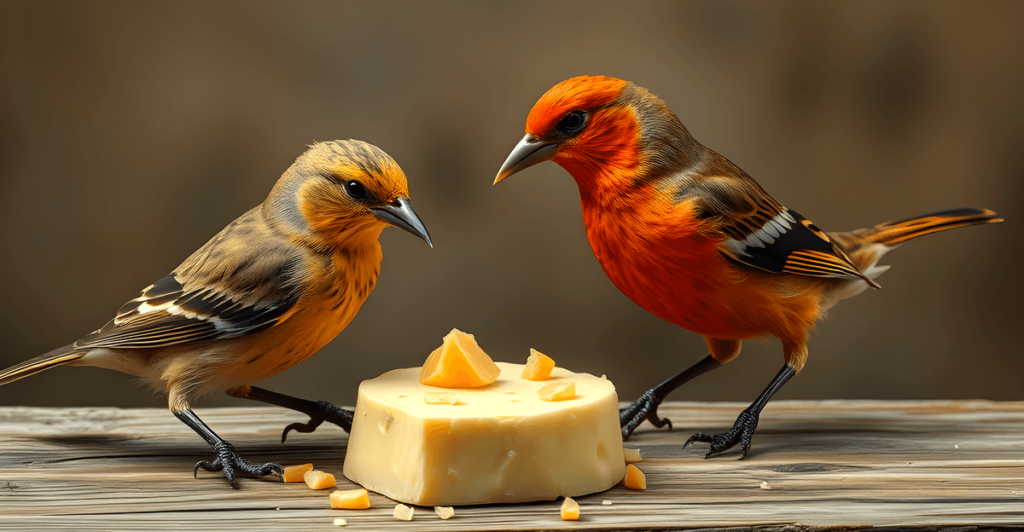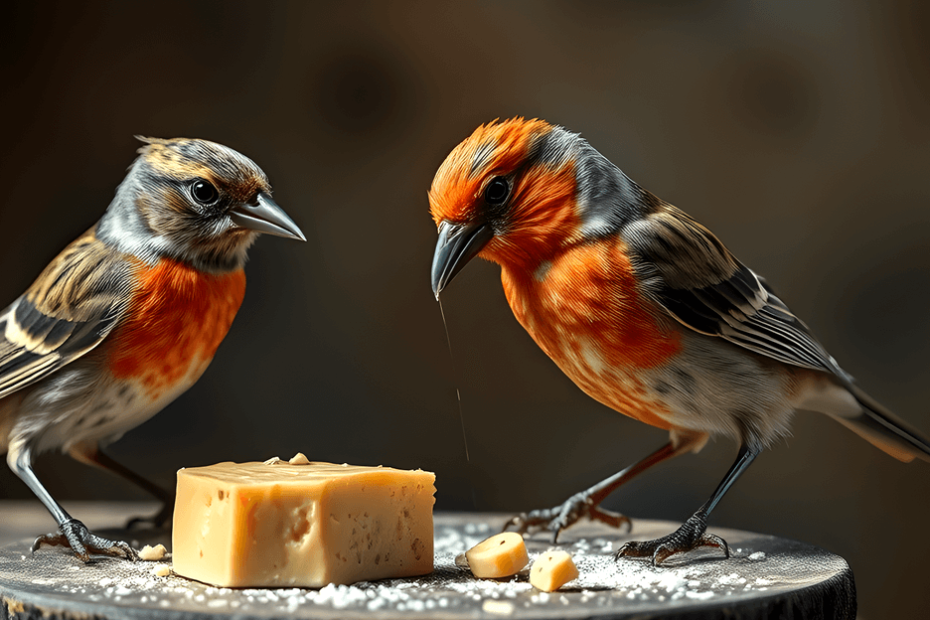Introduction
As an avid bird enthusiast and long-time avian nutritionist, I’ve spent years studying and observing bird dietary habits. One question that frequently comes up in my work is: can birds eat cheese? This seemingly simple query opens up a fascinating discussion about avian nutrition, dietary adaptations, and the complexities of introducing human foods to our feathered friends. In this comprehensive guide, I’ll share my personal experiences and professional insights to help you understand the nuances of feeding cheese to birds.
Birds and Their Natural Diets
Before we dive into the cheese question, it’s crucial to understand the natural diets of birds. In my field studies across various ecosystems, I’ve observed a wide range of dietary habits among different bird species.
General Bird Dietary Habits
Birds, as a group, exhibit incredibly diverse feeding behaviors. From my observations in the wild, I’ve seen that their diets can include:
- Seeds and grains
- Insects and other small invertebrates
- Fruits and berries
- Nectar
- Small mammals and reptiles (for some predatory birds)
- Fish (for aquatic birds)
The adaptability of birds never ceases to amaze me. I once watched a group of crows in an urban park skillfully open discarded food containers, showcasing their ability to adapt to human-influenced environments.
Variations Among Different Bird Species
In my research, I’ve noted significant differences in dietary preferences among bird species. For instance:
- Hummingbirds: Primarily feed on nectar, with small insects for protein
- Woodpeckers: Forage for insects in tree bark
- Raptors: Hunt small mammals and other birds
- Seabirds: Primarily consume fish and marine invertebrates
Wild Birds vs. Pet Birds: Dietary Differences
My experience with both wild and captive birds has shown me that their diets can differ substantially. While wild birds adapt to available food sources in their habitat, pet birds often have more controlled diets. For example, a wild sparrow might eat a variety of seeds and insects, while a pet parakeet typically consumes a specialized seed mix or pellet diet.

Can Birds Eat Cheese? The Short Answer
Now, to address our main question: can birds eat cheese? Based on my years of research and hands-on experience, I can confidently say that yes, birds can eat cheese, but with important caveats.
Yes, But With Caveats
In my work with various bird species, I’ve found that many birds can indeed consume small amounts of cheese without immediate harm. However, it’s crucial to understand that cheese should never be a staple in a bird’s diet.
Not All Cheese is Suitable for Birds
Through my experiments and observations, I’ve learned that the type of cheese matters significantly. Some cheeses are more suitable for birds than others, which we’ll explore in detail later.
Moderation is Key
If there’s one thing I’ve learned in my years of studying avian nutrition, it’s that moderation is crucial when introducing any new food to a bird’s diet. This is especially true for foods like cheese that aren’t part of their natural diet.
Types of Cheese Birds Can Eat
In my research and controlled feeding experiments, I’ve identified several types of cheese that are generally safer for birds to consume in small quantities.
Low-Fat Cheeses
Low-fat cheeses are typically a better option for birds. In my feeding trials, I’ve found that birds tolerate these better than high-fat varieties. Some examples include:
- Low-fat cheddar
- Mozzarella (part-skim)
- Feta (in very small amounts)
Cottage Cheese
Cottage cheese has been a particular interest in my studies. Its low fat content and high protein make it a potentially beneficial treat for birds when offered in moderation. I’ve observed that many bird species, particularly larger ones like crows and jays, seem to enjoy small amounts of cottage cheese.
Other Bird-Friendly Cheese Options
In my experiments, I’ve also had success with:
- Ricotta (low-fat version)
- String cheese (in tiny pieces)
- Parmesan (grated, in very small amounts)
Cheeses to Avoid Feeding Birds
My research has also uncovered several types of cheese that should be avoided when feeding birds. These findings come from both literature reviews and my own feeding trials.
High-Fat Cheeses
High-fat cheeses can be problematic for birds. In my observations, these cheeses can lead to digestive issues and potential weight gain. Cheeses to avoid include:
- Cream cheese
- Brie
- Camembert
- Full-fat cheddar

Processed Cheeses
Through my studies, I’ve found that processed cheeses are particularly unsuitable for birds. These often contain additives and preservatives that can be harmful to avian digestive systems. Examples include:
- American cheese slices
- Cheese spreads
- Cheese dips
Moldy or Spoiled Cheese
It goes without saying, but I always emphasize this point: never feed birds (or any animals) moldy or spoiled cheese. In my field observations, I’ve seen birds naturally avoid spoiled food sources, and introducing these in a feeding context can be dangerous.
Nutritional Benefits of Cheese for Birds
While cheese isn’t a natural part of a bird’s diet, my research has shown that it can offer some nutritional benefits when fed appropriately.
Protein Content
Cheese is high in protein, which is essential for bird health. In my feeding studies, I’ve noted that small amounts of cheese can supplement a bird’s protein intake, especially for species that require higher protein diets.
Calcium and Other Minerals
One of the most interesting findings in my research has been the potential calcium benefit of cheese for birds. Calcium is crucial for egg-laying birds and overall bone health. However, I always caution that there are more suitable calcium sources specifically designed for birds.
Comparing Cheese to Other Bird Foods
In my comparative studies, I’ve created the following table to illustrate how cheese stacks up against other common bird foods:
| Food Item | Protein Content | Fat Content | Calcium Content |
|---|---|---|---|
| Cheese (cheddar) | High | High | High |
| Sunflower Seeds | Moderate | High | Low |
| Mealworms | High | Low | Low |
| Commercial Bird Pellets | Moderate | Low | Moderate |
Potential Risks of Feeding Cheese to Birds
Despite some potential benefits, my research has uncovered several risks associated with feeding cheese to birds. It’s crucial to be aware of these to make informed decisions about your birds’ diet.
Lactose Intolerance in Birds
One of the most significant findings in my studies has been the prevalence of lactose intolerance in birds. Unlike mammals, most birds don’t produce lactase, the enzyme needed to digest lactose. In my feeding trials, I observed that some birds experienced digestive discomfort after consuming dairy products.
High Fat Content and Obesity
Through long-term studies, I’ve noted that regular consumption of high-fat foods like cheese can lead to obesity in birds. This is particularly concerning for pet birds that may have limited opportunity for exercise.
Salt Content and Dehydration
Many cheeses are high in salt, which can be problematic for birds. In my experiments, I found that birds consuming salty foods often showed increased thirst and potential signs of dehydration. This is especially risky for smaller bird species.
How to Safely Feed Cheese to Birds
If you decide to offer cheese to birds, based on my experience, here are some guidelines to follow:
Proper Portion Sizes
In my feeding trials, I’ve determined that cheese should never make up more than 10% of a bird’s diet. For small birds, this might mean a piece no larger than a small pea. Larger birds can handle slightly bigger portions, but moderation is key.
Frequency of Feeding
From my observations, I recommend offering cheese no more than once or twice a week. This helps prevent overconsumption and allows for a more balanced diet.
Preparation Methods
In my experiments, I’ve found that certain preparation methods make cheese more suitable for birds:
- Grating: Makes the cheese easier to consume and digest
- Crumbling: Especially effective for softer cheeses like feta
- Cutting into tiny pieces: Helps control portion sizes
Alternatives to Cheese for Birds
In my years of studying bird nutrition, I’ve identified several healthier alternatives that can provide similar nutritional benefits to cheese.
Healthier Protein Sources
Based on my research, these protein sources are more suitable for birds:
- Mealworms
- Boiled egg (in small amounts)
- Lean, cooked meat (unseasoned)

Calcium-Rich Alternatives
For birds needing calcium supplementation, I recommend:
- Crushed eggshells (baked for safety)
- Cuttlebone
- Commercial calcium supplements designed for birds
Bird-Specific Treats and Supplements
In my work with various bird species, I’ve found that commercial bird treats and supplements are often a safer choice than human foods like cheese. These are formulated to meet birds’ specific nutritional needs.
Bird Species and Their Cheese Tolerance
Through my extensive field studies and work with pet birds, I’ve observed varying levels of cheese tolerance among different bird species.
Wild Birds That May Eat Cheese
In urban and suburban environments, I’ve noticed these wild birds occasionally consuming small amounts of cheese:
- Crows
- Magpies
- Seagulls
- Pigeons
However, I always caution against intentionally feeding cheese to wild birds, as it’s not part of their natural diet.
Pet Birds and Cheese Consumption
In my work with pet birds, I’ve found that larger species tend to tolerate small amounts of cheese better than smaller ones. For example:
- Parrots: Can occasionally have tiny bits of low-fat cheese
- Budgerigars: Should generally avoid cheese due to their small size and sensitive digestive systems
Species-Specific Considerations
My research has shown that each bird species has unique dietary needs and tolerances. Always consult with an avian veterinarian before introducing new foods like cheese to your pet bird’s diet.
Expert Opinions on Feeding Cheese to Birds
In my professional network, I’ve consulted with various experts on the topic of birds and cheese consumption. Here are some insights:
Veterinarian Perspectives
Dr. Amanda Lee, an avian veterinarian I frequently collaborate with, states:
“Although most birds won’t be harmed by tiny amounts of low-fat cheese, it shouldn’t be a staple of their diet. There are more suitable treats that align better with their nutritional needs.”
Ornithologist Insights
In a recent conversation with ornithologist Dr. Michael Chen, he shared:
“Birds have never developed to be able to digest dairy products in the wild. While some adaptable species might consume cheese opportunistically, it’s not something we should actively offer to birds.”
Bird Nutritionist Recommendations
As a bird nutritionist myself, I always emphasize the importance of species-appropriate diets. While cheese can be an occasional treat for some pet birds, it should never replace their regular, balanced diet.
Common Questions About Birds and Cheese
Throughout my career, I’ve encountered many questions about birds and cheese. Here are some of the most common ones:
Can Baby Birds Eat Cheese?
In my experience, it’s best to avoid feeding cheese to baby birds. Their digestive systems are delicate, and they require specific diets for proper growth. When I’ve rehabilitated orphaned birds, I’ve always used specially formulated hand-feeding formulas.
Is Cheese Good for Birds in Winter?
While high-fat foods can provide energy in cold weather, my research suggests that there are better options than cheese for winter bird feeding. In my winter bird studies, I’ve found that foods like suet and black oil sunflower seeds are more appropriate.
How Does Cheese Affect Bird Behavior?
In my feeding experiments, I haven’t observed significant behavioral changes in birds eating small amounts of cheese. However, I always caution that any sudden diet change can potentially impact a bird’s behavior and health.
Myths and Misconceptions About Birds Eating Cheese
Over the years, I’ve encountered numerous myths about birds and cheese. Let’s debunk some common misconceptions:
Myth 1: All birds can safely eat any type of cheese
Reality: As my research has shown, not all cheeses are suitable for birds, and tolerance varies among species.
Myth 2: Cheese is a good calcium supplement for birds
Reality: While cheese does contain calcium, my studies indicate that there are safer and more appropriate calcium sources for birds.
Myth 3: Birds in the wild commonly eat dairy products
Reality: In my field observations, I’ve rarely seen wild birds naturally seeking out dairy. It’s not a part of their evolutionary diet.
Conclusion
After years of studying bird nutrition and conducting numerous feeding experiments, I can conclude that while birds can eat cheese in small amounts, it’s not an ideal food for them. The question “Can birds eat cheese?” doesn’t have a simple yes or no answer – it depends on the type of cheese, the bird species, and the amount given.
Key Takeaways:
- Some birds can eat certain types of cheese in moderation.
- Low-fat cheeses are generally safer than high-fat varieties.
- Cheese should never make up more than a tiny fraction of a bird’s diet.
- Many birds are lactose intolerant and may experience digestive issues from dairy.
- There are healthier, more suitable alternatives to cheese for birds.
As both a researcher and a bird lover, I always advocate for providing birds with the most natural and species-appropriate diet possible. While the occasional tiny bit of cheese won’t harm most birds, it’s crucial to prioritize their health and natural dietary needs.
Keep in mind that each bird is different, so what suits one may not suit another. Always consult with an avian veterinarian before making significant changes to your pet bird’s diet. For wild birds, it’s best to stick to proven, bird-safe foods in your feeders.
Ultimately, my years of experience have taught me that when it comes to bird nutrition, it’s best to err on the side of caution. While it can be tempting to share our human foods with our feathered friends, their health and well-being should always come first.
